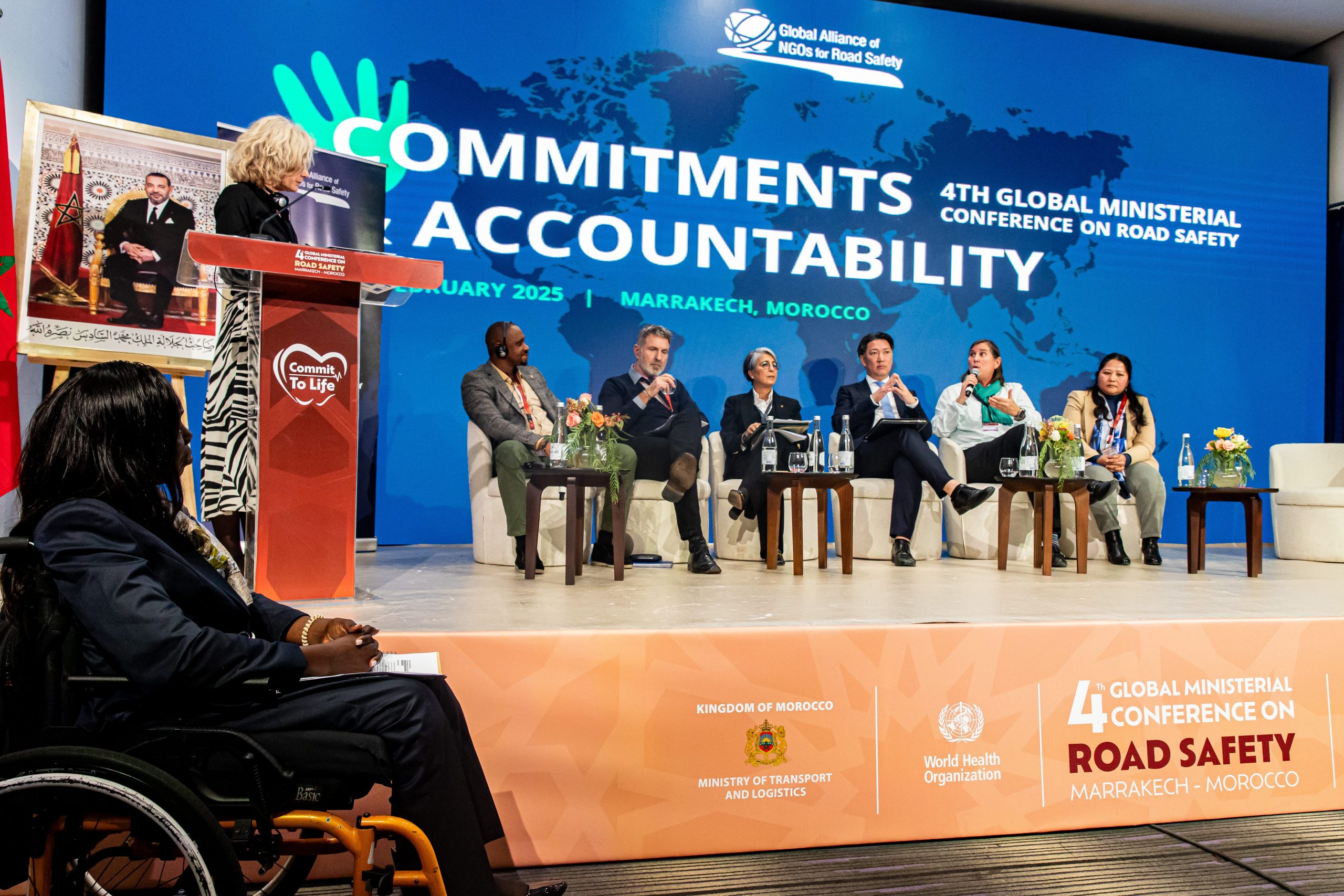
At the 4th Global Ministerial Conference on Road Safety in Marrakech, heads of delegations were invited to make public commitments during plenary sessions. The Alliance has analyzed these commitments against the core principles in our call to action. We have also analyzed the Marrakech Declaration—which calls on governments to prioritize road safety, ensure sustained funding, and accelerate actions to halve road deaths by 2030—against its predecessor, the Stockholm Declaration to identify if global priorities have progressed or regressed in the last five years.
Our analysis presents mixed outcomes that signal a worrying lack of accountability to deliver road safety.
Only 25 out of 194 WHO member states made a public commitment during the plenary sessions, although we continue looking forward to the publication of commitments that have been made online. The low uptake by heads of delegations to publicly make commitments falls short of the universal commitment needed to halve road deaths and injuries by 2030.
The evolution from the Stockholm Declaration to the Marrakech Declaration signals some progress in greater inclusions of key parameters of financing, evidence-based action, sustainable mobility, commitment and accountability, Safe System approach and Vision Zero. However, concrete accountability mechanisms to ensure that these are put into place and implemented are still lacking. In addition to the lack of real accountability mechanisms, the wording remains cautious—in forms of encouragement and acknowledgements without guarantees of delivery—’express deep concern’, ‘recognize’, ‘acknowledge’, ‘encourage’, ‘welcome’, ‘call upon’, ‘consider’. These wordings suggest a lack of enforceable obligations by member states. Improvements are needed in decisive language and accountability mechanisms, including the measurement and regular public reporting of progress on implementation indicators such as financing, evidence-based action, sustainable mobility, Safe System approach, and Vision Zero. These changes are crucial as we approach the midpoint of the Decade of Action for Road Safety 2021-2030.
The Marrakech Declaration acknowledges the importance of implementing evidence-based interventions such as speed management, pedestrian facilities and certified helmets as well as the Safe System Approach and Vision Zero. Among the publicly stated commitments, five out of 25 countries (20%) mentioned using a Safe System Approach, while 3 countries (12%) mentioned Vision Zero. Notably, 15 countries (60%) mentioned at least one Priority Intervention—a set of interventions that have been proven to be among the most effective in reducing road deaths and injuries. However, 16 countries also mentioned actions where the evidence-base is uncertain. While mentions of an evidence-based intervention is a promising sign, every country should commit to evidence-based interventions only.
The Marrakech Declaration highlights the critical issue of underfunding, especially in low- and middle-income countries and the need for increased investments. However, the publicly stated commitments lacked timelines and financing. While 14 of 25 countries (56%) mentioned a timeline for specific actions, 5 countries only mentioned the Decade of Action timeline (2030) not attached to specific actions and 6 countries did not mention any timeline. A mere 3 countries (12%) referenced financing. Funding and timeline are barometers of whether a commitment is serious and are necessary for monitoring and implementation. The lack of this detail risks commitments becoming just words without a genuine intention to implement them.
Our analysis showed regression in the Marrakech Declaration in commitment to NGO involvement in comparison to the Stockholm Declaration. Only three of the 25 countries (12%) explicitly mentioned NGO engagement. This suggests governments’ overlook of NGOs’ essential roles as advocates that promote accountability, bring realities on the ground and community perspectives, augment the evidence base, unite stakeholders and empower communities. NGOs keep road safety on the government agenda, thereby driving progress toward road safety-related SDGs.
Actions speak louder than words. We NGOs will keep monitoring for actions. We demand improvements in commitments by including specific actions that are evidence-based only with dedicated financing and timelines for those specific actions. We urge decision makers to make commitments and declarations that demonstrate accountability through enforceable mechanisms and public reporting of implementation indicators. We call on the global road safety community to harness NGO involvement to accelerate actions for sustainable change. However, commitments and declarations are not enough. NGOs will hold governments accountable for their commitments and declaration by closely monitoring implementation.
As we approach the midpoint of the decade, we must move beyond making commitments to accountability and make real, enforceable changes that save lives and injuries on the road for all people.
The Alliance will hold an online session on how NGOs can use the declaration and commitment analyses as an advocacy and policy-influencing tool on Wednesday 9 April 2025 at 13:30 CET. Register HERE.